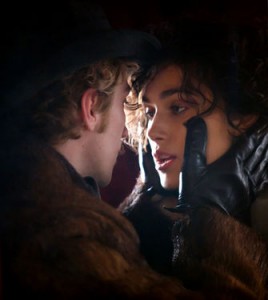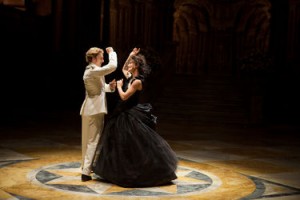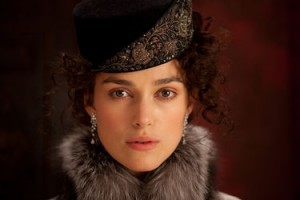I attended a Variety screening Monday night of Anna Karenina, and stayed afterward for the Q&A with director Joe Wright and Keira Knightley. It’s the kind of movie that benefits from such a chat.
 For the latest adaptation of Leo Tolstoy’s novel about a married woman who falls in love with another man and is destroyed by her affair, Wright and company decided to take the highly stylized, theatrical route, placing many of the scenes on an actual stage with props and matte paintings in the background, revealed by velvet curtains. Everything is heightened, and how much you like it will depend on how willing you are to forgo realism. If you’re a Baz Luhrmann fan, you’ll probably love this.
For the latest adaptation of Leo Tolstoy’s novel about a married woman who falls in love with another man and is destroyed by her affair, Wright and company decided to take the highly stylized, theatrical route, placing many of the scenes on an actual stage with props and matte paintings in the background, revealed by velvet curtains. Everything is heightened, and how much you like it will depend on how willing you are to forgo realism. If you’re a Baz Luhrmann fan, you’ll probably love this.
I respect Wright for undertaking this bold experiment, and parts of it are engaging. Aaron Taylor-Johnson (Kick Ass) and Keira Knightley, in opulent costumes, have potent chemistry as Anna and Count Vronsky, making us yearn for them to be together almost as much as they do. Jude Law needed to be dumbed down quite a bit to play the dull, cuckholded Karenin, but his subtle performance is convincing and sympathetic.
 Wright is clever in using the stage setting to convey the idea of a much bigger space, and to transition between scenes. Anna goes from a ballroom to her home by simply climbing a set of stairs. She sits down in a chair in her drawing room, but parts the curtains and the scenery outside indicates she’s on a moving train. Because of the stylization, punctuated by a rhythmic score, the actors’ movements—Knightley’s most of all—are precisely choreographed, but the cast makes the “dance” look like second nature, performing what Wright calls “a ballet with words.”
Wright is clever in using the stage setting to convey the idea of a much bigger space, and to transition between scenes. Anna goes from a ballroom to her home by simply climbing a set of stairs. She sits down in a chair in her drawing room, but parts the curtains and the scenery outside indicates she’s on a moving train. Because of the stylization, punctuated by a rhythmic score, the actors’ movements—Knightley’s most of all—are precisely choreographed, but the cast makes the “dance” look like second nature, performing what Wright calls “a ballet with words.”
The energy can’t be sustained, though, and once the passion cools between Anna and Vronsky, I started to lose interest in the movie.
After the screening, the director explained that he was trying to get closer to “the expressive interior landscape of the characters” and felt he couldn’t do it with realism. Setting most of the action on an actual stage seemed appropriate, since Russian society at the time “was performing their lives…they wanted to be French.” The people spoke French, wore French fashion, so when Anna gets up in the morning, Wright shows her getting dressed like an actress about to step in front of the footlights.
 During the Q&A, Knightley came across smart, funny, articulate, and passionate in her defense of Anna. When the moderator asked how the actress approached playing a character some readers find loathsome, Knightley said, “I didn’t like her. I loved her.” She explained that she’s in no position to judge a woman who’s flawed by her humanity, who hurts those she loves most, because Knightley herself is sometimes guilty of such behavior. She added, “How can you not feel for a creature who’s suffering?”
During the Q&A, Knightley came across smart, funny, articulate, and passionate in her defense of Anna. When the moderator asked how the actress approached playing a character some readers find loathsome, Knightley said, “I didn’t like her. I loved her.” She explained that she’s in no position to judge a woman who’s flawed by her humanity, who hurts those she loves most, because Knightley herself is sometimes guilty of such behavior. She added, “How can you not feel for a creature who’s suffering?”
Wrights wrapped up the evening by admitting this movie is an experiment, saying “filmmakers have an obligation to experiment.” It may not have been a complete success, but I appreciate Wright and his team giving the text a daring new interpretation.
Nerd verdict: A bold—if not entirely successful—experiment
Photos: Laurie Sparham/Focus Features






10 Comments
jenn aka the picky girl
November 14, 2012 at 7:50 amInteresting. I abhor this book, but I’ve been curious about the film. I think the staging might actually make me feel even more distant from Anna than I already do, watching a stage through a screen and all that. I’m surprised about the chemistry because Aaron Johnson looks like such an absolute tart in this. I suppose that’s part of the act. I like that he emphasized the playacting so present in that time period, but I’m still not sure this is one I want to watch.
Pop Culture Nerd
November 16, 2012 at 1:32 pmHa! I love the word “tart,” especially when applied to a man.
The staging did keep me at arm’s length at times, making me very aware I was watching a production instead of fooling me into thinking I’m getting a glimpse of real life and genuine emotions. But some of the theatricality is clever eye candy so I went with it for the most part.
Laura Benedict
November 14, 2012 at 10:34 amTerrific, thoughtful review. Like Jenn, I loathe this novel. I detest Anna and Vronsky. I would only watch it for the pretty dresses. Good on you for doing the dirty work for us!
Pop Culture Nerd
November 16, 2012 at 1:33 pmOh, yes, it was very dirty work.
Jann
November 14, 2012 at 10:48 amGosh, I loved the novel, although I read it many lives ago. Perhaps I need to revisit it at this stage of my life-semi retired content “middle ager” with grown children, as opposed to a young romantic newlywed (or maybe I wasn’t even married yet).
Pop Culture Nerd
November 16, 2012 at 1:42 pmKnightley said her perception of the book changed between the first time she read it as a teen and subsequent readings as a twentysomething preparing to play Anna. She initially thought Anna was romantic and innocent and everyone else was bad, but later recognized that Anna did some awful, hurtful things.
EIREGO
November 14, 2012 at 6:56 pmI read this book a long time ago, but I take issue with Knightly defense of ANNA in the Q&A. How can I not feel for a creature who is suffering? A) she is suffering because of her own doing. and B) Anna is more than a creature, she is a human being with the best of everything who throws it all away for a superficial roll in the hay. Yes, we have all done stupid things for love, but most of us get this type of behavior out of our systems before we stand up in front of all our friends and family to pledge our eternal love for someone. No, I haven’t seen the movie, but in the novel Anna is married with a 4 or 5 year old child. WTF?! Have I become a prude? Maybe this movie is bad timing.
Oh well, probably will miss this one.
BTW: Really liked SKYFALL.
Pop Culture Nerd
November 16, 2012 at 1:48 pmI think Anna suffers because of her circumstance and the mores of the time. She gets married young (18 or so?) and then falls in love with someone else, something she didn’t plan. Yes, she’s responsible for acting on those feelings, but if she didn’t, she would’ve suffered, too. Nowadays divorce isn’t a big deal but back then her situation must’ve seemed impossible to her. I read the book a long time ago and can’t recall my reaction to it (not sure I even finished it) but this is what I got from the movie.
Natalie ~ the Coffee and a Book Chick
November 21, 2012 at 11:38 amWhy does Keira Knightley always do that thing with her mouth where her mouth is never closed? There’s always this gap between her lips, as though it’s intended to be sexy, or whatever. Weird.
On a completely different (yet infinitely more mature) note, I would love to see this film for the set design alone. I really need to read this book at some point, but have to find six months sometime to be able to devote to it…
Pop Culture Nerd
November 21, 2012 at 2:23 pmMy guess is either someone told her that’s sexy so she’s sticking to that look, or her teeth and lips make it hard for her to close her mouth properly. I don’t mean that in a derisive way; I think she’s beautiful. But I’ve noticed her teeth are uneven (which I like, because she doesn’t look doctored) and protrude a little.